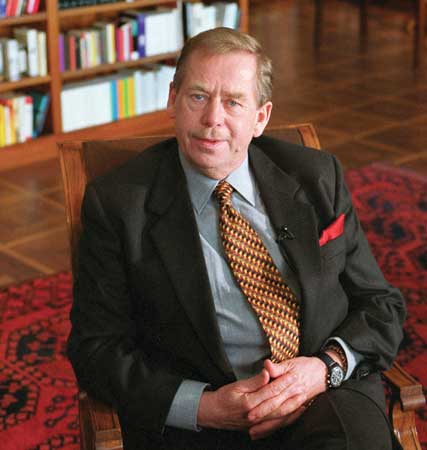This weekend of December, 2011, continues to experience the loss of some of the true giants defending the ramparts of western civilization. The dissident playwright who became his country’s founding father, Vaclav Havel, passed away today at the age of 75. Mssr. Havel would be pleased to be recognized as a defender of the Ramparts – no life in the 20th century is more tied to the concept of the free expression of ideas as the fundamental weapon in the liberation from totalitarianism. He may have been a little put off to share the ramparts stage with his alter-ego Czech nemesis, Vaclav Klaus, current President of the Czech Republic, and Ramparts People We Should Know #1 – but he would probably have shrugged his shoulders and moved on. He was always a calm estuary in a turbulent sea of dangerous events, and was always about the achieving the ultimate goal in a steady non-violent fashion. This quiet, steady playwright, though, was truly one of the momentous figures of the 20th century, participating in a 25 year struggle to lift his country and in effect all of Eastern Europe from the suffocating embrace of totalitarianism, and in celebration of his unequivocally triumphal life, deserves to be Ramparts People We Should Know #19.
Vaclav Havel was the epitome of what proved to be the ultimate weapon of the Cold War, a starry eyed intellectual professing ideas. A modestly popular playwright with a gift for beautiful expression in his native tongue, Havel grew into adulthood in the 1960’s into a stultifying blanket of oppression behind the so called iron curtain of Soviet dominated eastern Europe. He was every bit a child of the sixties, yearning for the right to listen to the Rolling Stones, or participate in freestyle relationships. Unlike the “hippie” culture of the west, however, Havel as an intellectual, saw the reflection of such superficial rights in the greater context of fundamental and universal human rights that were savaged by the all powerful few running the Politburo and her Soviet puppet clients. The final straw for him was the short lived Prague Spring in 1968 which Communist leader Alexander Dubcek made the mistake of assuming the Communism could co-exist with basic human rights. Havel participated in the briefly permitted public forums under Dubcek and became recognized as a national figure in Czechoslovakia. The Soviet impulse to crush any dissent culminated in the invasion of Warsaw Pact forces, and the ruthless toppling of Dubcek’s short lived experiment.
The effect on Havel was galvanizing, and despite enormous pressures and multiple imprisonments, he proceeded to devise a long term strategy for the exposure of the farce of the propped up system and its collapse, forming Charter 77, a group of writers and dissidents who would expose the system’s frailties, contradictions, and crimes. With other movements such as Solidarity in Poland the pressure on monobloc began to grow and cracks progressively developed, climaxing in the spectacular year of 1989 and the fall of the Berlin Wall and sequential loss of control over events by the tyrants of the the Warsaw Pact group. The week of November 24th, 1989, proved to be Czechoslovakia’s turn, with the presence of daily massive demonstrations in the hundreds of thousands in what was eventually termed the Velvet Revolution culminating in the November 24th resignation of the entire Czech communist leadership. Typical for the heady times, the populations of eastern Europe turned to their revolutionaries to lead, with variable results, but in Czechoslovakia’s case, Havel as President despite the lack of training was up to the task. He shepherded the progressive movement of Czechoslovakia into the European Union and NATO and managed to navigate the dissolution of Czechoslovakia into the Czech Republic and Slovakia in a peaceful and successful transition in 1992.
Havel lived long enough to see his beloved homeland take a proud irrevocable position in the European community and experience the flowering of a truly free society. Like all idealists he found himself somewhat disappointed with the eventual compromises required in a society where all views require respect, but like the calm contemplater he was, lived to accept the realities of the modern world. What he achieved with the quiet but overwhelming power of the ideas of liberty was stunning and historical, and the changes to the world once assumed impossible, as a result of courageous visionaries like Havel, blossomed into the brilliant sunshine of freedom peaceably, in one of the true miracles of this or any other era.
The story of Havel deserves a special place in our hall of heroes who have manned the ramparts defending the fragile ideals of our western civilization. He passes quietly into a elite group of warriors who will be remembered for their understanding, that the most devastating weapon against totalitarianism is not the number of military divisions, but the simple power of ideas.

